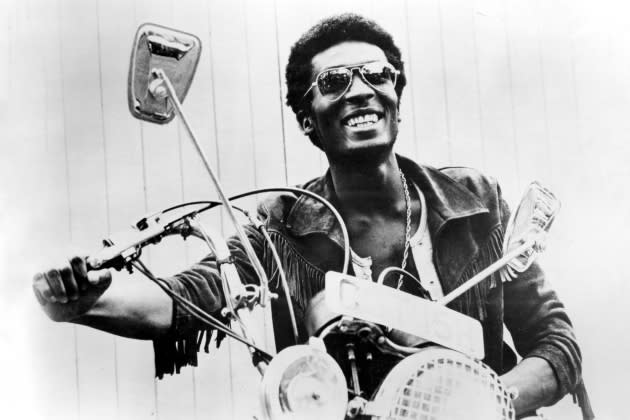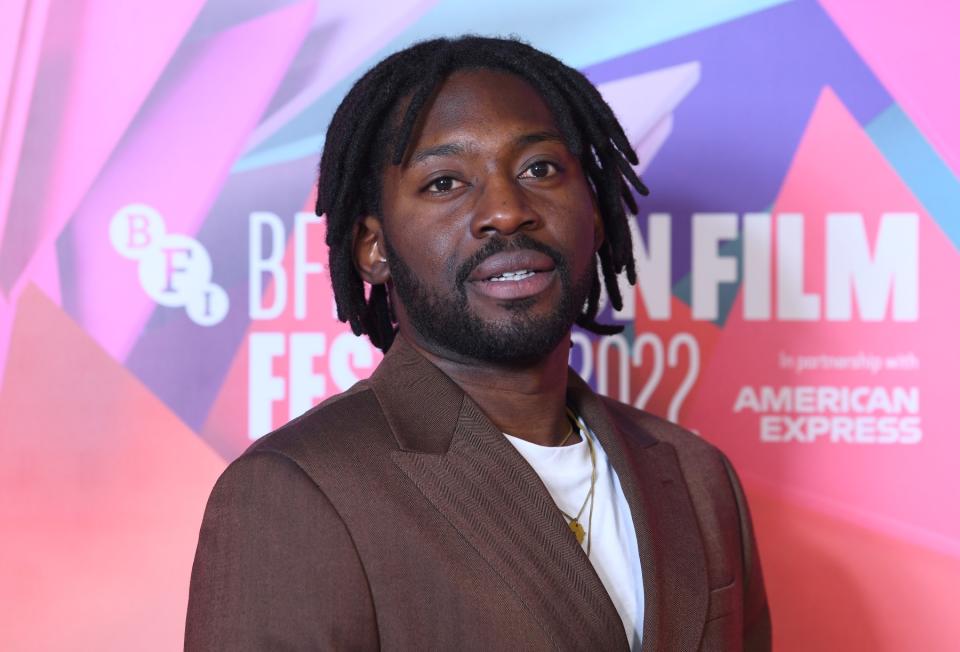‘The Harder They Come’ Was a Hero’s Journey Set to Reggae. It’s About to Become a New Musical

The musical impact of The Harder They Come, Perry Henzell’s 1972 film about an aspiring reggae singer who becomes an outlaw and anti-hero, can’t be understated. At the time, few outside of Jamaica had ever heard of the likes of Bob Marley, but The Harder They Come — starring Jimmy Cliff — introduced a global audience to the rhythms of the country. In 2020, it was included in the Library of Congress’ National Registry, and its Cliff-dominated soundtrack, an essential reggae collection in and of itself, was ranked 174 on RS’ Top 500 Albums of All Time.
But 50 years on, is The Harder They Come still relevant — and could it appeal to a new generation? An in-the-works musical based on the film, as well as a possible movie remake, are aiming to answer yes to both. In terms of its anniversary, “I could have just shown the film at a festival, but for me that wasn’t enough,” says Henzell’s daughter, filmmaker Justine Henzell. “My question was: Can one great piece of art inspire more great pieces of art?”
More from Rolling Stone
Spoon Goes Dub: Inside the New Remix Project 'Lucifer on the Moon'
Reggae Hero Protoje Returns From the 'Hills' With Fierce New Music
Scheduled to open at New York’s Public Theater in March, the stage production of The Harder They Come will join an extremely short list of musicals that use reggae as a musical foundation. The scant others include a pair of Marley jukebox musicals (one of which wraps up its London run next month.) The Harder They Come, however, will debut in New York and could, potentially, make its way to Broadway.
Like the movie, the stage incarnation of The Harder They Come tells the story of Ivan, a hungry singer and songwriter who moves from the countryside to Kingston to make it in the music business. To his dismay, he encounters nothing but menial work (including running weed) and a sleazy local music kingpin who rips him off. Ivan eventually achieves the fame and recognition he craves — after a deadly shootout with police makes him an on-the-run celebrity renegade and his song an anthem.
“[It] was such a landmark movie because it was very real. None of us were professional actors,” Cliff told RS in 2019. “And the story is the story of any one of us who was born in the country or coming from the country; as much as a movie like Scarface, who was coming from Cuba and then he came to the United States looking to make a fortune in the city, because we’re all told that it’s in the city that we can make it.”
As ambitious as the idea of a Harder They Come musical may sound, the creators behind it are anything but unserious. Co-directed by Sergio Trujillo (who nabbed a Tony for his choreography in the hit Temptations jukebox musical Ain’t Too Proud) and Tony Taccone, the adaptation was written by Suzan-Lori Parks, the Pulitzer-winning playwright whose credits include stage productions Topdog/Underdog, Plays for the Plague Year, and Unchain My Heart: The Ray Charles Musical; the screenplay for last year’s The United States vs. Billie Holiday; and creator, writer, and showrunner for the Genius: Aretha series. The role of Ivan will be played (and sung) by Natey Jones, who — in the small-reggae-musical-world department — took on the role of Peter Tosh in the Marley musical Get Up, Stand Up.
But this isn’t the first time someone has tried to bring The Harder They Come to the stage. In 2006, a stripped-down musical based on the story premiered in London, where it played on and off for two years. Henzell himself wrote it but died the year it opened. “It had a successful run,” says Justine Henzell, who oversees her late father’s work, “but he always wanted a New York production.”
When the movie’s 50th anniversary began coming into view a few years ago, the idea of an all-new stage version was top of Henzell’s mind. She’d seen the first incarnation of Parks’ Topdog/Underdog about 20 years earlier and wanted to work with the playwright. “When the idea of staging it in New York came up,” Henzell says, “there was only one person I wanted as the writer.”
Parks was too young to have seen The Harder They Come when it premiered in U.S. theaters in 1973, a year after its Jamaican debut. When she finally saw it later in life, she sensed a connection to her own work. “Ivan sees the injustices in the world but doesn’t let that stop him,” she says. “Those are the kind of characters I’m drawn to. I advocate for the unsung heroes.”
With Henzell’s blessing, and occasional input from Cliff, Parks wrote a treatment that sticks to the movie’s core plot and characters and incorporates select scenes from the movie — Ivan recording in the studio, or a church choir raising the roof. “I didn’t have any interest in reinventing the wheel,” she says. “They’d done such a beautiful job with the movie. I wanted to roll the wheel forward and make it impactful for the days we live in now.”
To that end, Parks gave Ivan additional dialogue to tap into the current socio-political-economic climate. “We’re allowing him to give more voice to how the poor are treated differently from the rich,” Parks says. “Even with all the advances we’ve made in world culture, there are still so many limitations being put on people. Less advantaged people are told to behave and do things by the book, and when they don’t, the hammer comes down hard. The rich man can be bad and do whatever he pleases, and doesn’t seem like he has to pay for it.”
Parks also gave the movie’s two leading female characters, Ivan’s lover Elsa and his mother Daisy, more of a backstory. “Elsa’s a bold young woman who has ideas and dreams of her own. She doesn’t take any shit!” Parks says. Henzell found that aspect of the show particularly rewarding: “As a woman, I’m happy that Elsa and Daisy’s roles have been expanded.”
The showdown with police that sends Ivan down the criminal path is also in the musical, but Parks sees it as occupying a different plot point now: Ivan is pushed into his position by collusion between the local police and record producers. “I really focus on the fact that it was an accident,” she says. “This man has remorse. He knows he did wrong. And he’s also pushed to a place where mistakes happen. He wants to make a record. He knows he has talent. And when a person knows they have talent and society keeps pushing them down, what kind of pressure cooker does that make?”

With Henzell’s and Cliff’s approval, Parks also expanded the musical scope of the project. The songs from the original album — “Sitting in Limbo,” “You Can Get It If You Really Want,” “The Harder They Come” — are in the show, but so are later Cliff songs like “Wonderful World, Beautiful People” and “Better Days Are Coming,” as well as Johnny Nash’s 1972 hit “I Can See Clearly Now” and the gospel song “Just a Closer Walk with Thee.” Some songs appear in different spots: “Many Rivers to Cross” was moved from accompanying Ivan’s search for a job to a more climactic moment in the show. Parks, a songwriter herself, contributed several of her own tunes.
More than just an action movie set in Jamaica, The Harder They Come touches on many themes that resonate today. There is economic disparity, police and music-biz corruption, and the fame that accompanies notoriety. Parks draws a comparison to Ivan selling the right to his song for a mere $20 to a recent story involving a major artist’s own rights to her recordings. “When Taylor Swift is put in an unfair situation with her music, you think, ‘What the fuck?’” Parks says. “Before, you still thought, ‘What the fuck?’ But now you think it isn’t just Black artists. That kind of treatment — the difficulties Prince or Taylor had — happen over and over again to artists of all races and levels of fame.”
The reconceptualizing of The Harder They Come won’t stop when the show opens in March. A just released edition of the original album includes the live-in-the-studio version of “The Harder They Come” as seen in the movie, and another soundtrack with remixes is in the works. Henzell owns the rights to the film too, but is mum on the details of the in-development remake, only calling it a “re-imagining, just the way the musical is not a straight remake.”
On the surface, Ivan’s story — which ends with him being shot to death by police as he tries to escape his country by boat — would seem a downer for any musical. But both Henzell and Parks find the overall tale uplifting. “The story of having a dream and going after that dream despite all odds is a universal one,” says Henzell. “Even though Ivan does bad things, you have sympathy for the motivation behind it. You’re rooting for him to get his due… To a certain degree he achieves his ambitions — everyone knows about him — but he went about it in a way that was not right. There were consequences. So it’s also a cautionary tale.”
Parks, who calls the project “a joyous celebration of a hero’s struggle,” refuses to see the tale as a bleak one. “A lot of people in more affluent countries think the only joyous story is when the person wins at the end — that cliché of the American happy ending,” she says. “I see it as a story of tenacity and resilience, of a young man coming to the big city and wanting to be a recording star or make a record. And he got to make a record! He does win in the end because the hero never dies. Take Jesus, for example. He had a different life, but we’re still talking about him. That dude won. And Ivan won.”
Best of Rolling Stone
